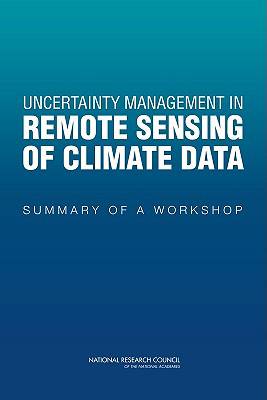
- Afhalen na 1 uur in een winkel met voorraad
- Gratis thuislevering in België vanaf € 30
- Ruim aanbod met 7 miljoen producten
- Afhalen na 1 uur in een winkel met voorraad
- Gratis thuislevering in België vanaf € 30
- Ruim aanbod met 7 miljoen producten
Zoeken
Uncertainty Management in Remote Sensing of Climate Data
Summary of a Workshop
National Research Council, Division on Engineering and Physical Sciences, Division on Earth and Life Studies, Committee on Earth Studies, Space Studies Board, Committee on Applied and Theoretical Statistics, Board on Mathematical Sciences and Their Applications, Climate Research Committee, Board on Atmospheric Sciences and Climate
Paperback | Engels
€ 33,95
+ 67 punten
Omschrijving
Great advances have been made in our understanding of the climate system over the past few decades, and remotely sensed data have played a key role in supporting many of these advances. Improvements in satellites and in computational and data-handling techniques have yielded high quality, readily accessible data. However, rapid increases in data volume have also led to large and complex datasets that pose significant challenges in data analysis. Uncertainty characterization is needed for every satellite mission and scientists continue to be challenged by the need to reduce the uncertainty in remotely sensed climate records and projections. The approaches currently used to quantify the uncertainty in remotely sensed data lack an overall mathematically based framework. An additional challenge is characterizing uncertainty in ways that are useful to a broad spectrum of end-users.
In December 2008, the National Academies held a workshop, summarized in this volume, to survey how statisticians, climate scientists, and remote sensing experts might address the challenges of uncertainty management in remote sensing of climate data. The workshop emphasized raising and discussing issues that could be studied more intently by individual researchers or teams of researchers, and setting the stage for possible future collaborative activities.
In December 2008, the National Academies held a workshop, summarized in this volume, to survey how statisticians, climate scientists, and remote sensing experts might address the challenges of uncertainty management in remote sensing of climate data. The workshop emphasized raising and discussing issues that could be studied more intently by individual researchers or teams of researchers, and setting the stage for possible future collaborative activities.
Specificaties
Betrokkenen
- Auteur(s):
National Research CouncilDivision on Engineering and Physical SciencesDivision on Earth and Life StudiesCommittee on Earth StudiesSpace Studies BoardCommittee on Applied and Theoretical StatisticsBoard on Mathematical Sciences and Their ApplicationsClimate Research CommitteeBoard on Atmospheric Sciences and Climate
- Uitgeverij:
Inhoud
- Aantal bladzijden:
- 63
- Taal:
- Engels
Eigenschappen
- Productcode (EAN):
- 9780309139588
- Verschijningsdatum:
- 1/10/2009
- Uitvoering:
- Paperback
- Formaat:
- Trade paperback (VS)
- Afmetingen:
- 150 mm x 224 mm
- Gewicht:
- 117 g

Alleen bij Standaard Boekhandel
+ 67 punten op je klantenkaart van Standaard Boekhandel
Beoordelingen
We publiceren alleen reviews die voldoen aan de voorwaarden voor reviews. Bekijk onze voorwaarden voor reviews.











